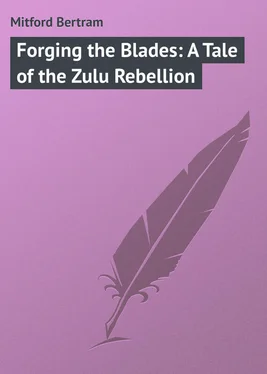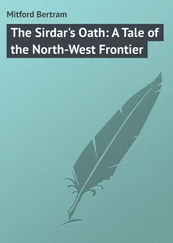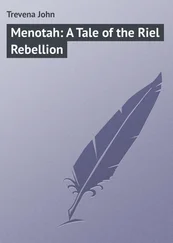Bertram Mitford - Forging the Blades - A Tale of the Zulu Rebellion
Здесь есть возможность читать онлайн «Bertram Mitford - Forging the Blades - A Tale of the Zulu Rebellion» — ознакомительный отрывок электронной книги совершенно бесплатно, а после прочтения отрывка купить полную версию. В некоторых случаях можно слушать аудио, скачать через торрент в формате fb2 и присутствует краткое содержание. Жанр: foreign_prose, на английском языке. Описание произведения, (предисловие) а так же отзывы посетителей доступны на портале библиотеки ЛибКат.
- Название:Forging the Blades: A Tale of the Zulu Rebellion
- Автор:
- Жанр:
- Год:неизвестен
- ISBN:нет данных
- Рейтинг книги:4 / 5. Голосов: 1
-
Избранное:Добавить в избранное
- Отзывы:
-
Ваша оценка:
- 80
- 1
- 2
- 3
- 4
- 5
Forging the Blades: A Tale of the Zulu Rebellion: краткое содержание, описание и аннотация
Предлагаем к чтению аннотацию, описание, краткое содержание или предисловие (зависит от того, что написал сам автор книги «Forging the Blades: A Tale of the Zulu Rebellion»). Если вы не нашли необходимую информацию о книге — напишите в комментариях, мы постараемся отыскать её.
Forging the Blades: A Tale of the Zulu Rebellion — читать онлайн ознакомительный отрывок
Ниже представлен текст книги, разбитый по страницам. Система сохранения места последней прочитанной страницы, позволяет с удобством читать онлайн бесплатно книгу «Forging the Blades: A Tale of the Zulu Rebellion», без необходимости каждый раз заново искать на чём Вы остановились. Поставьте закладку, и сможете в любой момент перейти на страницу, на которой закончили чтение.
Интервал:
Закладка:
This was a blank outlook. The still atmosphere of the forest seemed more fever-breathing than ever, and the sky had darkened. A boom of thunder came rolling through the stillness, not so distant either, then a gleam and then another sullen roll. He started. This was no joke. He was in for a sudden storm, and among all these tall tree-trunks too. If only he could reach some native kraal.
But, then, he had heard that the natives were restless, and that it was not altogether safe for one man alone to go among many. He was well armed, certainly, but what is one among many? He had sufficient food for one meal, and a flask. By way of putting a more cheerful light on the situation he took a pull at the latter.
“A beastly place to camp in,” he said to himself, looking around. “Faugh! It simply reeks of fever. If only one could find somewhere more open.”
Now the lightning began to gleam vividly down through the tree-tops, and the thunder crashed in short, angry barks; but no rain had fallen as yet. It was one of those most dangerous storms of all – a dry storm. Suddenly a big yellowwood, barely thirty yards off, burst into splinters and sparks as a wreath of flame ran down it into the ground. The thunder-crash that accompanied was awful. The wayfarer’s steed started violently and backed, nearly throwing its rider, then stood stock still, trembling and snorting.
“Oh, blazes, that’s nasty!” growled the latter. “Well, I suppose if one has to go under one has, but I’d rather not just at present. Hullo! what’s that?”
Far a sound had reached him from in front – a sound uncommonly like the barking of dogs. The horse had heard it too, for it pricked up its ears and snuffed the air. By now it was going dead lame.
A few big drops came pattering through the trees, then ceased. The thunder-rolls grew less frequent and less loud. The storm was passing over.
Now the barking of dogs sounded nearer and nearer. Instinctively the wayfarer looked to the cartridges in his revolver, then, replacing the weapon, continued to advance, yet very much on the look-out.
The forest ended abruptly. In front, on a bare ridge or spur, running down from a great height, lay a small kraal, numbering four huts, enclosed within a circular thorn stockade. Beyond it again lay an unbroken mass of forest.
The appearance of the wayfarer in the open was the signal for a rush of dogs from the kraal gate. These were not of the ordinary native greyhound breed, but massive bullet-headed brutes of the Boer mastiff type, and as formidable as wolves. There were three of them, and their savage charge and deep-mouthed baying caused the horseman instinctively to grasp the butt of his revolver. He had no fancy for being pulled from his saddle. On the other hand, if he were to shoot one or all of them, would he not have human enemies to deal with scarcely less formidable? And as though to bear out this idea, three tall, savage-looking Zulus, armed with broad assegais, strode through the gate towards him.
The wayfarer began to think he had got into a bad fix. He had six revolver shots and a rifle bullet, as against three human and three four-footed enemies, and the chances were all in favour of the latter, out in the open like this, and mounted as he was on a lame horse. But the natives began by calling off the dogs, which was reassuring; yet they seemed to be barring his way, while talking to him volubly. Here again he was in a quandary, for except for a word or two of ordinary use he could understand no Zulu. There was one argument, however, which he judged to appeal to all mankind, wherefore he produced a capacious tobacco pouch.
But even that met with no response. The demeanour of the trio was the reverse of friendly, and behind them the three great, evil-looking brutes were stalking up and down, their hackles raised, and muttering and growling, as though impatient for the word to spring upon the stranger. Then after a consultation among themselves, one of the men turned and went into the kraal again.
The wayfarer was nonplussed. It was obvious that they were incapable of understanding each other, for even to signs they seemed impervious.
At last, however, the other man reappeared, and made it apparent, by very unmistakable signs, that he should dismount and enter.
This he accordingly did, trying not to show the while that he was keenly on his guard against treachery. They signed him to a hut, that he should enter it. He crept through the low door way. The interior was dark after the daylight outside, and he took a minute or two to get accustomed to the semi-gloom. Then he realised that the place contained one man, and he a European.
He was squatted on the floor, native fashion, smoking a pipe. He was an old man apparently, for his hair and thick beard were white, yet the face somehow did not seem quite to correspond. It looked younger, but there was an expression in it which was very curious, one of mingled melancholy and malevolence, at least so decided the stranger. But no word or movement of welcome did he make towards the latter, who, perforce, had to open the conversation.
“Well, this is very jolly,” he began, “stumbling upon a white man. The fact is I can’t talk the lingo, and couldn’t ask the way for one thing.”
“Where are you bound for?”
The voice, dead, dull, expressionless, was peculiar. But it was a refined voice.
“I wanted first to get to Ezulwini.”
“You were going in exactly the contrary direction, that’s all.”
The other started. Had this mysterious personage been aware of his progress all along? he wondered. The thought was rather disquieting under all the circumstances. The man was a puzzle. He seemed to prefer his unexpected guest’s room to his company.
“My horse has gone dead lame,” went on the latter. “He may be all right in the morning. But, meanwhile, I shall have to throw myself upon your hospitality, or camp outside in the veldt.”
The other was silent for a moment. Then he said —
“You are welcome – on one condition.”
“And that?”
“That you pledge me your word of honour – you are a gentleman, I see, and will keep it – that you mention no word to any living soul, under any circumstances whatever, that you have been here, or, in short, that you have ever seen me in your life.”
“Well, of course I will, if you wish it,” answered the traveller, very much mystified.
“But I do wish it,” was the reply, given with some fierceness. “And you will do it. Do you know that at a word from me you would never leave this place alive? You would simply disappear.”
Substantially the very words he had uttered to that other, who had disappeared. There was a creepy suggestiveness about it all that made him feel more than uncomfortable.
“You needn’t threaten me,” he rejoined, rather shortly. “If I pass you my word, as you yourself have just said, I shall keep it.”
“I know you will. And let me tell you that if you had been as some others I know you would not be here at all. In fact, although you have exactly seven bullets at your immediate disposal your friends would never have seen or heard of you again.”
The mystery deepened. The new arrival was conscious of a very uncanny, not to say awe-inspiring effect in the piercing, unfriendly glance from the other’s eyes. The day had been a pretty eventful one and no mistake.
“Look here,” he answered, in a burst of frankness. “This world’s a devilish rum place, and I’ve lived long enough in it, and seen enough devilish rum sides of it, to have learnt enough to respect other people’s secrets. So you may rely upon me when I give you the full undertaking you ask for.”
The other nodded, then uttered a loud hail, in response whereto a native boy appeared, and having received a laconic direction soon reappeared, together with a large bowl of native beer.
Читать дальшеИнтервал:
Закладка:
Похожие книги на «Forging the Blades: A Tale of the Zulu Rebellion»
Представляем Вашему вниманию похожие книги на «Forging the Blades: A Tale of the Zulu Rebellion» списком для выбора. Мы отобрали схожую по названию и смыслу литературу в надежде предоставить читателям больше вариантов отыскать новые, интересные, ещё непрочитанные произведения.
Обсуждение, отзывы о книге «Forging the Blades: A Tale of the Zulu Rebellion» и просто собственные мнения читателей. Оставьте ваши комментарии, напишите, что Вы думаете о произведении, его смысле или главных героях. Укажите что конкретно понравилось, а что нет, и почему Вы так считаете.












